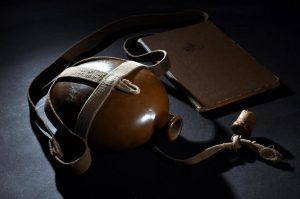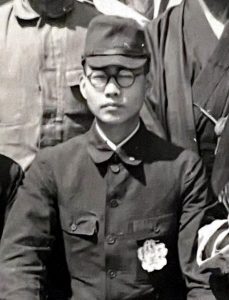Canteen communicates regrets of former soldier who was unable to provide water to victims, treasured notebook records A-bombing experiences
Aug. 1, 2023
by Fumiyasu Miyano, Staff Writer
“The faces of children and others asking for water were so pitiful.” A canteen used to give water to moisten the lips of dying A-bomb victims 78 years ago was found to exist. It had belonged to a young man who served as a cadet in the Japanese Imperial Army’s Shipping Command (known as the ‘Akatsuki Corps’). He had also left behind a notebook used to mourn the lives of those he was unable to save and to describe Hiroshima’s devastation. The still-luminous dark brown canteen with strap silently reminds us about the atomic bombing.
The young man, Yoshio Arai, had been assigned to the Army Ship Communications Reserve. Mr. Arai, 19 at the time and originally from Saitama Prefecture, ultimately died in 2021 at the age of 96. In the yellowish pages of his notebook, the cover of which is adorned with just one kanji character, ‘Akatsuki,’ he described details of what had happened on August 6, just three-and-a-half months after he had joined the Corps.
The night before, they had been evacuated due to an air-raid alert. On the morning of August 6, he had returned to his barracks in the area of Minami-machi (now part of Hiroshima’s Minami Ward), eaten breakfast, and just gone to bed. Following a huge roar, he was blown out of his bunk into a corridor and fell down the stairs. The time was 8:15 a.m., and the location was about 2.2 kilometers from the hypocenter.
He emerged from the devastated barracks and engaged in relief work in a cave on nearby Hijiyama Hill, where he witnessed truly hellish scenes. “Victims’ clothes were scorched and torn, their hair was burned, and their exposed skin was crimson red from the bombing’s thermal rays.” He also described the voices of children as they cried, groaned, and begged him for water.
People who had asked for water clung to his canteen and then died after drinking. Mr. Arai’s oldest daughter, Michiko, 65, who lives in Tokyo and heard stories about that time from her father while he was still alive, recalled, “His superior had told him that the wounded would die if they drank water, so my father apparently got rid of the water.”
After the war, Mr. Arai was employed at a water supply company in Tokyo. He married in 1954, and the couple had a son and two daughters. The family moved several times, but he kept the metal canteen in which had been etched his memories of the tragedy. He wrapped up the canteen in newspaper layers because he considered it “precious.”
“I think he kept it out of regret that he was unable to save people’s lives or give them water,” Michiko said about her father, imagining his motivations. In August of 2022, she donated her father’s canteen and notebook to the Hiroshima Peace Memorial Museum, located in the city’s Naka Ward. “I would be grateful if even one person’s heart could be moved by learning about the tragedy and horror of war that my father witnessed,” she said about the donation.
Mr. Arai recorded his state of mind in the notebook as he took care of a 16-year-old child soldier who had been seriously wounded in the bombing. “It is truly tragic that even young people like him are sent to war by militaristic leaders and made to continue marching toward their death whether or not they want to.” The young man’s lament about the war is evident in the words revealed in the notebook.
(Originally published on August 1, 2023)
“The faces of children and others asking for water were so pitiful.” A canteen used to give water to moisten the lips of dying A-bomb victims 78 years ago was found to exist. It had belonged to a young man who served as a cadet in the Japanese Imperial Army’s Shipping Command (known as the ‘Akatsuki Corps’). He had also left behind a notebook used to mourn the lives of those he was unable to save and to describe Hiroshima’s devastation. The still-luminous dark brown canteen with strap silently reminds us about the atomic bombing.
The young man, Yoshio Arai, had been assigned to the Army Ship Communications Reserve. Mr. Arai, 19 at the time and originally from Saitama Prefecture, ultimately died in 2021 at the age of 96. In the yellowish pages of his notebook, the cover of which is adorned with just one kanji character, ‘Akatsuki,’ he described details of what had happened on August 6, just three-and-a-half months after he had joined the Corps.
The night before, they had been evacuated due to an air-raid alert. On the morning of August 6, he had returned to his barracks in the area of Minami-machi (now part of Hiroshima’s Minami Ward), eaten breakfast, and just gone to bed. Following a huge roar, he was blown out of his bunk into a corridor and fell down the stairs. The time was 8:15 a.m., and the location was about 2.2 kilometers from the hypocenter.
He emerged from the devastated barracks and engaged in relief work in a cave on nearby Hijiyama Hill, where he witnessed truly hellish scenes. “Victims’ clothes were scorched and torn, their hair was burned, and their exposed skin was crimson red from the bombing’s thermal rays.” He also described the voices of children as they cried, groaned, and begged him for water.
People who had asked for water clung to his canteen and then died after drinking. Mr. Arai’s oldest daughter, Michiko, 65, who lives in Tokyo and heard stories about that time from her father while he was still alive, recalled, “His superior had told him that the wounded would die if they drank water, so my father apparently got rid of the water.”
After the war, Mr. Arai was employed at a water supply company in Tokyo. He married in 1954, and the couple had a son and two daughters. The family moved several times, but he kept the metal canteen in which had been etched his memories of the tragedy. He wrapped up the canteen in newspaper layers because he considered it “precious.”
“I think he kept it out of regret that he was unable to save people’s lives or give them water,” Michiko said about her father, imagining his motivations. In August of 2022, she donated her father’s canteen and notebook to the Hiroshima Peace Memorial Museum, located in the city’s Naka Ward. “I would be grateful if even one person’s heart could be moved by learning about the tragedy and horror of war that my father witnessed,” she said about the donation.
Mr. Arai recorded his state of mind in the notebook as he took care of a 16-year-old child soldier who had been seriously wounded in the bombing. “It is truly tragic that even young people like him are sent to war by militaristic leaders and made to continue marching toward their death whether or not they want to.” The young man’s lament about the war is evident in the words revealed in the notebook.
(Originally published on August 1, 2023)








